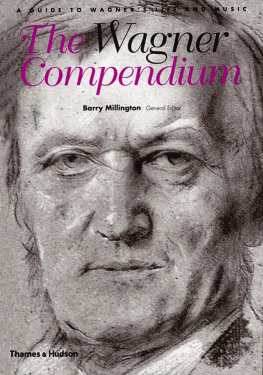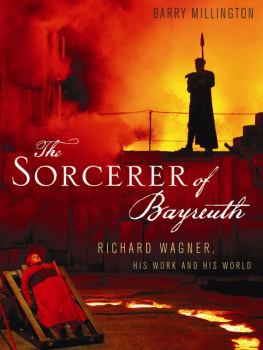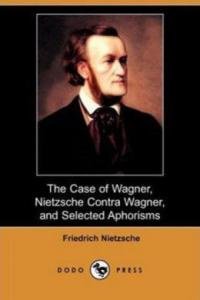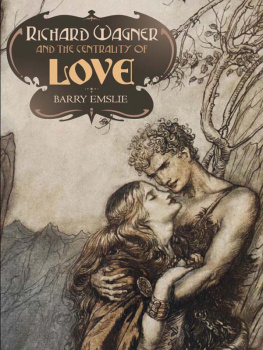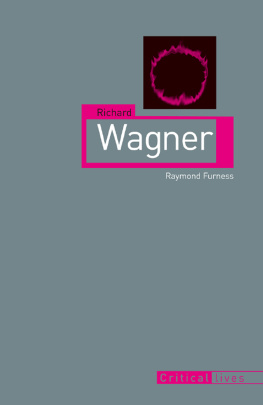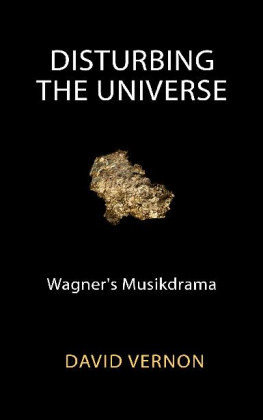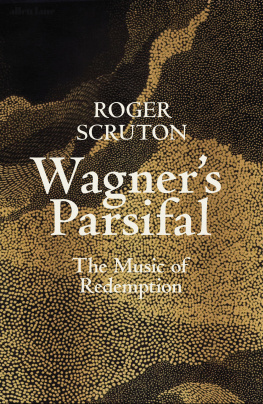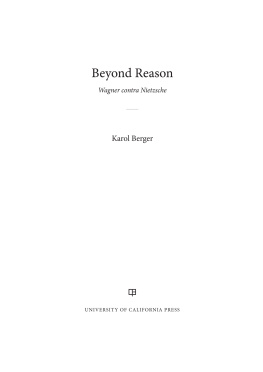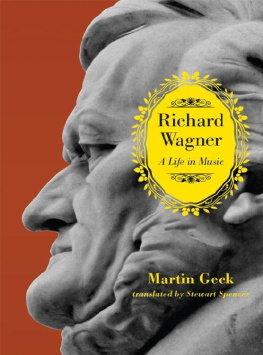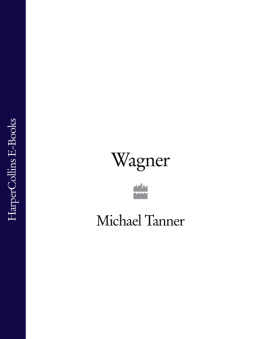Barry Millington - The Wagner compendium : a guide to Wagners life and music
Here you can read online Barry Millington - The Wagner compendium : a guide to Wagners life and music full text of the book (entire story) in english for free. Download pdf and epub, get meaning, cover and reviews about this ebook. year: 2001, publisher: Thames & Hudson, genre: Non-fiction. Description of the work, (preface) as well as reviews are available. Best literature library LitArk.com created for fans of good reading and offers a wide selection of genres:
Romance novel
Science fiction
Adventure
Detective
Science
History
Home and family
Prose
Art
Politics
Computer
Non-fiction
Religion
Business
Children
Humor
Choose a favorite category and find really read worthwhile books. Enjoy immersion in the world of imagination, feel the emotions of the characters or learn something new for yourself, make an fascinating discovery.
- Book:The Wagner compendium : a guide to Wagners life and music
- Author:
- Publisher:Thames & Hudson
- Genre:
- Year:2001
- Rating:5 / 5
- Favourites:Add to favourites
- Your mark:
- 100
- 1
- 2
- 3
- 4
- 5
The Wagner compendium : a guide to Wagners life and music: summary, description and annotation
We offer to read an annotation, description, summary or preface (depends on what the author of the book "The Wagner compendium : a guide to Wagners life and music" wrote himself). If you haven't found the necessary information about the book — write in the comments, we will try to find it.
The Wagner compendium : a guide to Wagners life and music — read online for free the complete book (whole text) full work
Below is the text of the book, divided by pages. System saving the place of the last page read, allows you to conveniently read the book "The Wagner compendium : a guide to Wagners life and music" online for free, without having to search again every time where you left off. Put a bookmark, and you can go to the page where you finished reading at any time.
Font size:
Interval:
Bookmark:
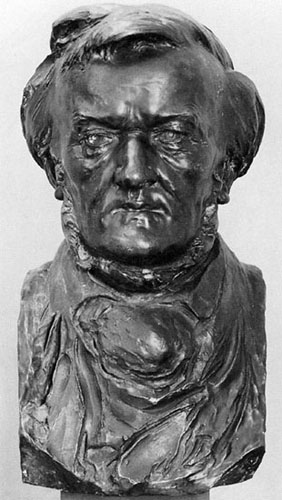
THE
WAGNER
COMPENDIUM
A GUIDE TO WAGNERS LIFE AND MUSIC
EDITED BY BARRY MILLINGTON

Barry Millington is chief music critic for the London Evening Standard and the editor of The Wagner Journal. He has written and edited, or co-edited, seven books on Wagner, including The Sorcerer of Bayreuth, Wagner's Ring of the Nibelung: A Companion, and the New Grove Guide to Wagner and his Operas.
In addition to his writing, he has also acted as dramaturgical adviser at the Bayreuth Festival and elsewhere.
Other titles of interest published by Thames & Hudson include:
Richard Wagner: The Sorcerer of Bayreuth
Wagners Ring of The Nibelung: A Companion
Verdi and/or Wagner: Two Men, Two Worlds, Two Centuries
Mahler: His Life, Work and World
Opera: A Concise History
The Chronicle of Opera: Year-by-year Four Centuries of Music, Performance and Recording
See our websites
www.thamesandhudson.com
www.thamesandhudsonusa.com
T HE AIM OF THIS BOOK is to provide a compendium of information on every significant aspect of Wagner and his music. The entire range of subject matter has been covered: the historical, intellectual and musical background; his acquaintances and contemporaries; his character and personality; his opinions and outlook; the sources from which our knowledge about him and his works is derived; his musical and literary style; orchestration and the performing of his music; and the impact of Wagner on both his contemporaries and posterity. There is also a chronological survey of his life, a full list of his prose writings, a comprehensive listing and discussion of the works, a glossary of Wagnerian terms and a section devoted to the mythmaking that has surrounded Wagner ever since he himself began to make notes for his future autobiography.
Within each section and sub-section of the Compendium we have endeavoured to present a digest of information representing the most up-to-date and authoritative thinking on the subject; the book is thus intended to be a handy reference tool rather than a work of literature. The emphasis throughout is on clarity and accessibility: the hope is that the Compendium (like its predecessors on Mozart and Beethoven) will prove to be useful to any general reader interested in Wagner or his music, as well as to the student and scholar, who will find information assembled here which would otherwise have to be culled from a variety of recondite sources.
With eighteen different authors writing on a subject as controversial, contradictory and multivalent as Wagner, a unified, consistent point of view is unlikely to be projected. Nor should it be. I have made no attempt to suppress opinions with which I disagree, or which conflict with views expressed elsewhere in the Compendium; rather the plurality of opinion should be seen as a reflection of the richness of the subject. This should not be taken, however, as an abdication of the editors responsibilities. Indeed, an overall pattern does emerge from the various contributions which I hope will enable Wagner to be seen in a new perspective. What is common to all the contributions is a healthy scepticism about the Wagner cult, and a refusal to indulge in sentimental mythmaking, neither of which is necessarily inconsistent with affection and admiration for the music, or even with respect for the man and his achievement. The latter point is important, because it is my belief that for all the desanctification, cynicism and critical reappraisal to which the composer has been subjected over recent decades, the Wagner phenomenon remains more susceptible to dubious Pavlovian responses than that of any composer born outside Salzburg. It would be good to think that we might be ready for a more dispassionate, better-informed approach to Wagner that located him more objectively in the historical context of the 19th-century Germany of which he was, according to Thomas Mann, the perfect epitome.
No composers life and work least of all Wagners lends itself to convenient pigeon-holing. A description of Wagners indebtedness to Otto Wesendonck, for example, could equally occur in the Whos Who or in the sections under patronage, character, finances or publishers. Each such subject receives fullest treatment in the most appropriate section, with cross-references from subsidiary discussions elsewhere. It is hoped that the list of contents, the index and the system of cross-references will guide the reader swiftly to the desired information.
Bibliographical references have been kept to a minimum. They have not generally been included where an opinion has been generally accepted; rather they serve to indicate controversial opinions, or recently discovered, and as yet little-known, scholarly-facts. Such references are shown as follows: Coleman, 1991, or, in cases where two or more publications emanate from the same year, Dahlhaus, 1989a.
Quotations from sources such as Wagners writings have with one or two exceptions (where they are revised versions of the standard Ashton Ellis translation) been freshly translated by the contributors themselves; again no attempt has been made to impose a monolithic unity on either the translation of oft-quoted phrases, such as ersichtlich gewordene Taten der Musik, or on the style of translation in general.
I would like to extend my warmest thanks to my seventeen coauthors for their patience and generous co-operation in the project and not least for their splendid contributions. In particular, I would like to thank Stewart Spencer, from whose unrivalled knowledge of matters Wagnerian the Compendium has immensely benefited: his punctilious reading of the entire manuscript has greatly enhanced its accuracy. Grateful thanks are also due to Ingrid Grimes, whose multifaceted skills make her the most sought-after proofreader in the business, and to all my friends and former colleagues at Thames and Hudson for their enthusiastic support and unsurpassed professionalism at all stages of the books production.
Barry Millington
LONDON 1991
22 May Born in the Brhl, Leipzig, the son of Johanna Rosine Wagner and (probably) Carl Friedrich Wagner: the rival claim of the actor and painter Ludwig Geyer has never been conclusively proved or disproved.
JulAug Johanna, presumably with the baby, travels 100 miles from Leipzig to Teplitz and stays with Geyer.
16 Aug Baptized in the Thomaskirche, Leipzig.
Oct Napoleon defeated at Leipzig in the Battle of the Nations.
23 Nov Carl Friedrich Wagner dies; Geyer offers family assistance.
Feb Johanna visits Geyer in Dresden; they become engaged.
28 Aug Johanna and Geyer are married.
Sep Congress of Vienna meets until Jun 1815, creating the German Confederation.
Attends (probably briefly) the school of Karl Friedrich Schmidt, the royal vice-Kantor.
Next pageFont size:
Interval:
Bookmark:
Similar books «The Wagner compendium : a guide to Wagners life and music»
Look at similar books to The Wagner compendium : a guide to Wagners life and music. We have selected literature similar in name and meaning in the hope of providing readers with more options to find new, interesting, not yet read works.
Discussion, reviews of the book The Wagner compendium : a guide to Wagners life and music and just readers' own opinions. Leave your comments, write what you think about the work, its meaning or the main characters. Specify what exactly you liked and what you didn't like, and why you think so.

